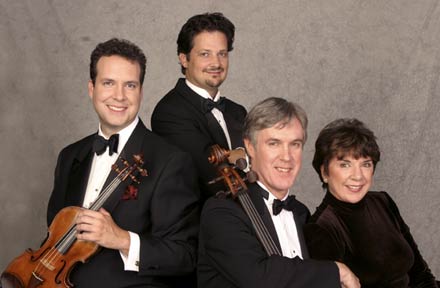Minimal Mozart, yet Bergonzi Quartet serves up winning program

The Mainly Mozart Festival presented a winning trio of late nineteenth and early twentieth century works Sunday afternoon at the ballroom of the Westin Colonnade Hotel in Coral Gables. The Bergonzi String Quartet, resident artists at the UM Frost School of Music, and guest pianist Marina Radyushina brought considerable fervor to major scores by Debussy, Bartok and Dohnanyi.
Eschewing the music of the series’ namesake, the Bergonzi foursome offered two bona fide masterpieces of the chamber music literature that reflect the experimental trends that swept through the music world during the twilight of romanticism. Debussy’s Quartet in G minor, Op.19 represents an open break with the prettified confections of Faure and Saint-Saens. The composer’s expansive harmonic palette and hazy flashes of instrumental color boldly define this landmark score.
The players imposed classical discipline on Debussy’s sensuous impressionism, bringing clarity and forward thrust to the music’s edgy impetus. There was rhythmic bite and incisive energy in the rapid pizzicato flourishes of the second movement. The quartet reached its zenith in the long limbed melody and gorgeous harmonic invention of the Andantino and the agitated energy of the finale was delineated with fierce propulsion. Any minor ensemble glitches were more than compensated for by the sheer dynamism of the Bergonzi’s realization of this wondrous piece.
The best performance of the afternoon was accorded Bartok’s Quartet in A minor, Op.7, the first of this seminal twentieth-century composer’s monumental six essays in the genre. A bracing mix of modernist astringency, romantic passion (for the composer’s flame, circa 1909) and ethnomusicology, the score bears a distinctive nationalistic stamp. Violinists Glenn Basham and Scott Flavin channeled intense yearning in the first movement’s introductory pages. The tonal richness of Pamela McConnell’s viola solo swept the Allegretto into inexorable motion. Cellist Ross Harbaugh was a tower of strength in solo and ensemble turns. A dynamic, fiery reading of the finale, a whirlwind of Hungarian peasant folk influences, concluded a vibrant performance of a ground breaking masterpiece.
A welcome revival of the Piano Quintet in C minor, Op.1 by Ernst von Dohnanyi concluded the imaginative program. The works of this prolific Hungarian composer-pianist deserve more frequent performance. (A transplanted Floridian, Dohnanyi spent his final decade teaching at Florida State University where his pupils included UM professor and Mainly Mozart music director Frank Cooper.)
The 1898 quintet is unabashedly Brahmsian, rich in melodic and contrapuntal invention. The Ukrainian-born Radyushina displayed impressive digital command and innate affinity for the score’s grandiose romantic gestures. The baby-grand keyboard could barely contain this gifted pianist’s large scale technique. Whether bringing eloquent stasis to the noble Adagio or buoyant, rapid fire brio to the finale, Radyushina revealed prodigious virtuosity and impressive ensemble skills. Collaborating with enthusiasm, the string players’ deep sonority captured the beauty and nostalgia of this late remnant of the romantic era.
The Mainly Mozart Festival continues 4:30 p.m. June 6 with the Amernet Quartet performing works of Mozart, Dvorak and Shostakovich. www.mainlymozart.com.
Posted in Performances
Leave a Comment
Mon May 31, 2010
at 12:17 pm
No Comments






